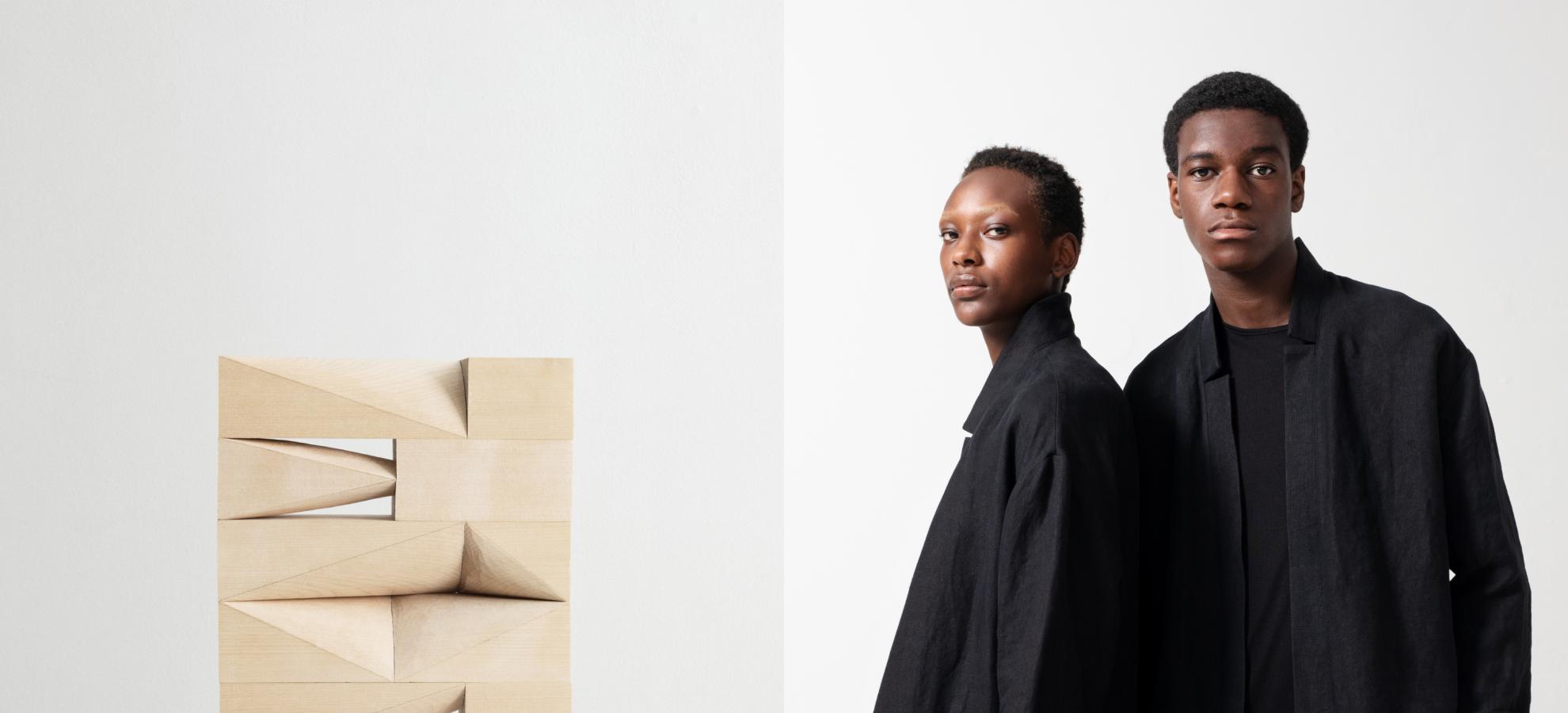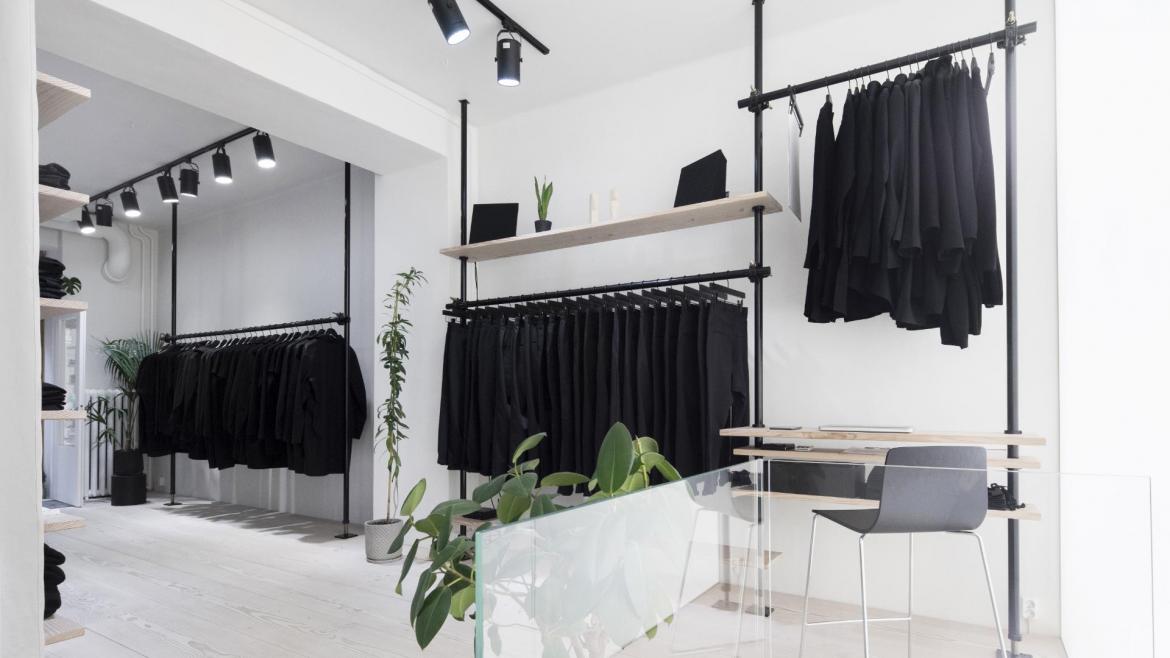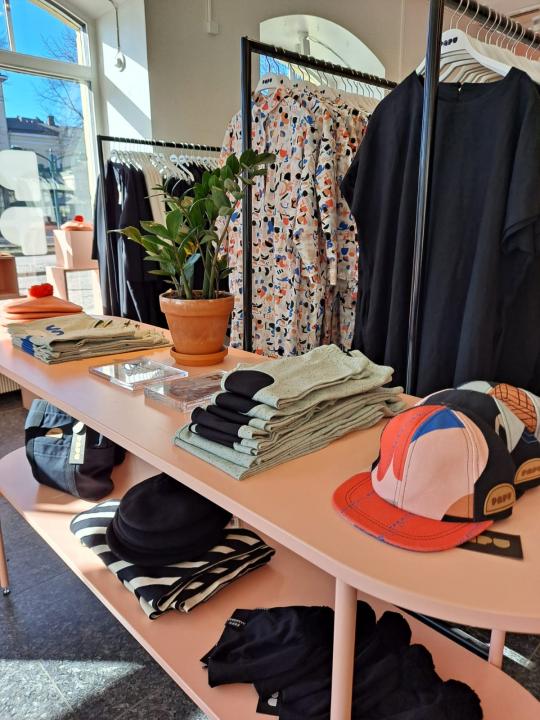
Over-the-top consumption has in many ways reached the end of its journey. Fast fashion and a throw-away culture are responsible for huge amounts of carbon dioxide emissions, and producers need to receive fair compensation for their labour, as well as decent working conditions. Shoppers should be mindful of where and what they consume. Shops sell more and more second hand items as well as garments and other items made from recycled materials. There are also several fashion libraries in Helsinki where customers can borrow clothes.

Less is more at Nomen Nescio
Usually, when talking about responsibility within the fashion industry, the focus is on the materials used and the working conditions at the clothing manufacturers. For the Nomen Nescio brand, founded by Finnish couple Niina and Timo Leskelä, the most important responsibility deed is minimalism and the gender neutrality it represents. But how so?
“Responsibility is a holistic idea for us, at the heart of which is a minimalist lifestyle and how our entire collection is built. We focus on functionality and sustainable design. Our clothes are also suitable for all life situations and are therefore seasonless,” says Minttu Vesala, Nomen Nescio's Communications and Marketing Manager.
In even more concrete way, this means that all the clothes in the collection are black, so they go together and are suitable for both men and women, as well as for both everyday and festive occasions. So less is more. "We want to draw attention to style and quality rather than passing trends. We hope that people will wear our clothes for as long as possible, even for the rest of their lives,” Vesala adds.
Of course, responsibility for Nomen Nescio also means sustainable and ecological materials and good working conditions. It uses linen, merino wool, Tencel, recycled polyester and organic cotton, for example, and production is kept in Europe: the fabrics are made in Italy and the clothes are sewn in Estonia. “It is of primary importance to us that the fabrics and clothing are manufactured in factories that operate according to the highest standards. We regularly visit the sites ourselves and ensure that employees are treated with dignity and that production takes place ecologically. We also provide detailed information about our production chain on our website,” says Vesala.
Nomen Nescio's collection is sold in two stores in the centre of Helsinki, in Kämp Gallery and on Mikonkatu, and it also has an online store. Deliveries are handled using DHL go green climate neutral shipping, which includes emissions compensation. Responsible operations at its stores include advising customers on how to look after and care for their clothing. “We have really excellent salespeople who carefully advise on how best to take care of our clothes. Information about materials and care is also provided on our website. Customers can even bring their clothes to us to repair,” says Vesala.
In the future, Nomen Nescio intends to further develop its operations and make them even more sustainable. For example, advances in ecological materials are being made in leaps and bounds. At the same time, Vesala emphasises the importance of not forgetting what is most essential. “The clothing should make you happy and feel lovely to put on – the kind that feels good and your own.”

Papu designs clothing that withstands time and use
Back in 2011, fashion designer Anna Kurkela began looking for better clothes for her 4-year-old son and newborn daughter. She was looking for clothing that would be simple and casual in style, comfortable to wear and made of ecological materials. When she failed to find what she was looking for, Kurkela decided to start designing these kinds of clothes herself – and the end result was the clothing brand Papu.
Over the years, Papu has grown and expanded. In addition to children's clothing, it now also has a women's collection. “We began designing clothes for adults due to popular demand. It started when parents began asking for adult versions of the same leggings and leotards that were popular with their children,” Kurkela says.
Papu is one of Finland's most responsible clothing brands and has ranked highly in surveys of domestic clothing brands conducted by Pro Ethical Trade Finland (Eetti). According to Kurkela, acting responsibly has been an absolute prerequisite for her work. The materials she uses include certified organic cotton, recycled polyester and lyocell, which is a cellulose-based modified fibre. Many of her clothes also comply with Oeko-Tex standards, which means that they do not contain harmful chemicals.
“Our collection comprises mainly indoor clothes, so it is not necessary to use as many chemicals in them as you do in outdoor clothes,” Kurkela explains.
Papu clothing is manufactured in Europe in high-quality and standard-compliant production facilities. Papu also visits the factories regularly. When designing the collection, responsibility is reflected in timeless and sustainable designs. Papu wants customers to enjoy their clothes for a long time. The loose and casual nature of its adult clothing helps ensure that they are long-lasting, even if the size of the wearer varies.
Naturally, children’s clothing will inevitably get small at some point. However, the Papu brand is so popular that it is quite easy to recycle and resell its clothes. “We have partnered with Emmy, a leading Nordic online store for pre-owned designer and brand apparel, and we also sell examples and second-quality items through them.”
Good care also maintains the resale value of clothing. The Papu website lists care instructions for different materials, and customers are also advised about care instructions in stores. “Our store on Pohjoisesplanadi has a contract with a sewing shop that does repairs, so clothes can also be repaired through us,” Kurkela adds.
Despite its growth, the Papu brand has kept its production in Europe and maintained personal relationships with the factories. This ensures that everything is handled properly in its own production chain and in a socially responsible way. Papu has calculated the carbon footprint of its own operations, but in the future the goal is to calculate the carbon footprint of the entire subcontracting chain. It also aims to be carbon neutral.
“A fully circular economy could be possible in the future, as the recyclability of materials is improving all the time. With regard to our collection, the goal is to get rid of seasonal thinking and invest instead in classic products.”
